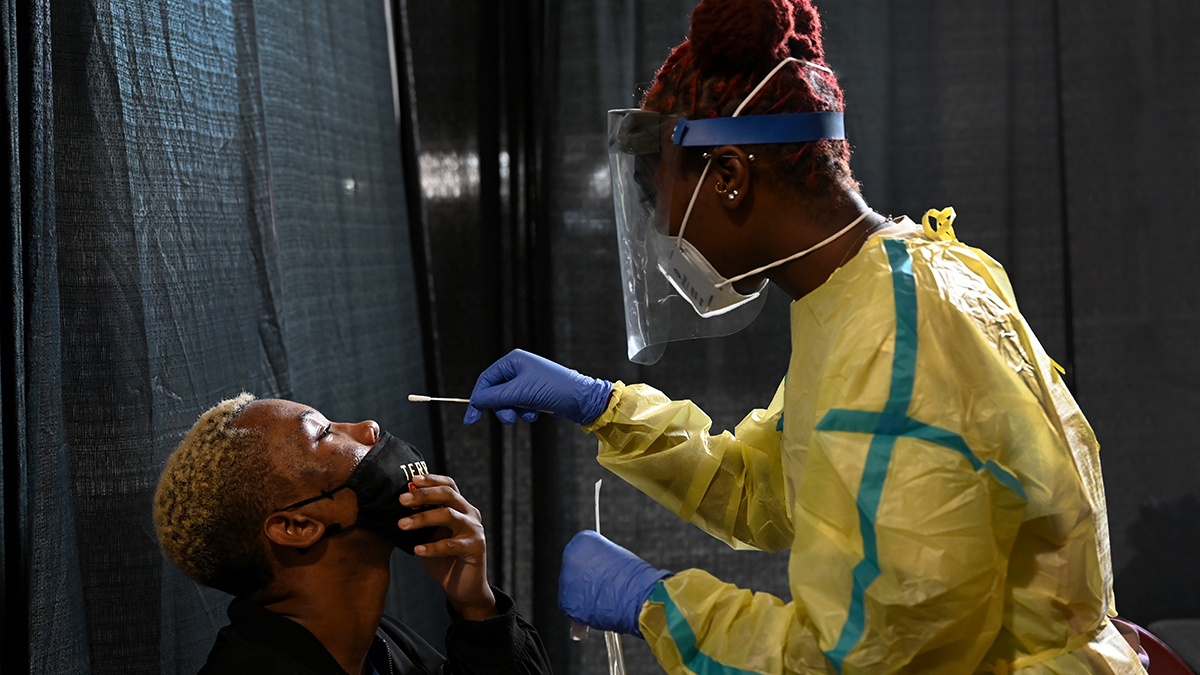As cases rise in the United States, new variant strains of the coronavirus are of increasing concern. Georgia officials said Tuesday they have confirmed the state’s first case of the COVID-19 variant first seen in the United Kingdom.
Health officials said Tuesday that lab tests found an 18-year-old Georgia man with no travel history is infected with the variant.
Cases of the United Kingdom variant have also been reported in Colorado, California, Florida and New York.
We're making it easier for you to find stories that matter with our new newsletter — The 4Front. Sign up here and get news that is important for you to your inbox.
If health care workers and other first responders miss appointments, others could be called so doses are not wasted. Some D.C. residents say they have made it onto vaccine waitlists at local grocery stores.
"If there are people who are available at the end of the day to be vaccinated, then you should vaccinate them," Health Director LaQuandra Nesbitt said at a news conference Monday.
However, she specified that appointments should only be made online, through D.C.'s online portal vaccinate.dc.gov, rather than by calling local stores.
On Tuesday, Maryland Gov. Larry Hogan announced at a news conference that steps would be taken to speed up the pace of COVID-19 vaccinations in the state.
Hogan said more than 270,000 doses of the vaccine have been provided to frontline workers in the state over the past three weeks, but that only 76,916 people had been vaccinated as of Tuesday.
“While none of us are thrilled with the pace of this rollout over the first couple of weeks, I can assure you that it is improving every day," Hogan said.
Starting Wednesday, the governor said the National Guard will begin to deploy emergency support teams across Maryland to help local health departments to expand vaccination capacity. Teams will have nine-to-14 guard members to help provide logistical support for vaccination clinics.
Prince George’s County Executive Angela Alsobrooks held a press conference Wednesday morning on the county’s COVID-19 response and vaccine distribution plan.
Alsobrooks said the process has been slow and the county will need additional help vaccinating vaccinators in order to move out of Phase 1A. The National Guard will arrive Thursday to provide additional support, she said.
The general public in Prince George's County can expect vaccinations to begin by late spring, Alsobrooks said.
Several other regional leaders are expected to address vaccinations and surging infections in their jurisdictions Wednesday.
County Executive Marc Elrich will give a news conference about vaccine distribution in Montgomery County at 12:30 p.m. Wednesday.
Gov. Ralph Northam will provide updates at 2 p.m. Wednesday on vaccine distribution in Virginia, with speculation that more details will be provided about which recipients will be included in Phase 1B.
A new study discovered that patients with milder forms of COVID-19 were more likely to lose their sense of taste and smell than patients with worse cases.
The study, published Wednesday in the Journal of Internal Medicine, found that 86% of patients with mild cases developed a loss of taste and smell, compared with 4–7% of those with moderate to severe cases.
The U.S. Food and Drug Administration (FDA) issued an alert Monday warning patients and health care providers of the risk of false results – particularly false negative results – with the Curative SARS-Cov-2 test.
The Curative SARS-Cov-2 test is a real-time test used to detect the virus that causes COVID-19. The test is authorized for prescription-only use and is performed by collecting a throat or nasal swab or an oral fluid specimen.
The risks of a false negative test result include delayed treatment and increased risk for the patient's close contacts and the larger community.
What the Data Shows
D.C. reported 316 new coronavirus cases and five additional lives lost on Wednesday. Maryland had 3,146 new cases and 47 deaths. Virginia recorded 3,690 new confirmed infections and 32 deaths.
Seven-day averages increased everywhere in the D.C. region. The average in D.C. increased to 246 and Maryland’s average rose to 2,745. Virginia set a new record with a seven-day average of 3,374 daily infections Wednesday.
Virginia continues to show the worst signs in the region.
Virginia’s positivity rate increased to 16.7% – that’s less than four percentage points lower than the state’s all-time high back in April.
Maryland’s positivity rate is at 9.44%, the highest level reached since May. D.C.'s positivity rate is at 6.2%
The number of hospitalized patients with confirmed coronavirus infections in Virginia increased to 2,618 Wednesday, a new record.
Maryland reported a record-breaking 1,862 hospitalizations Wednesday.
Hospitalizations also increased in D.C. – there are currently 265 hospitalized COVID-19 patients in the District.
Out of all hospital patients in D.C., 12.2% are coronavirus patients, indicating insufficient health care capacity, according to D.C.'s official reopening metrics.
Vaccinations in the region have surpassed the 200,000 mark as of Wednesday. Local vaccine portals indicate that 742 recipients in Maryland have received their second doses of COVID-19 vaccine.
Local Coronavirus Headlines
- D.C. residents age 65 and older, teachers and several categories of essential workers will be able to make appointments this month to receive a COVID-19 vaccine, officials say.
- More than 1,400 long-term care facilities in Virginia are expected to receive doses of the coronavirus vaccine in the coming weeks.
- Two D.C. friends got a lucky break while in Giant Food in Washington, D.C.,: When someone didn't show up for their vaccination appointment, the pharmacist asked him and his friend if they wanted to get the Moderna shot.
- Virginia reported another record day for new coronavirus infections, and that surge is putting even more pressure on hospitals in the commonwealth already pushed to the brink.
- Among the industries hit hardest by the pandemic has been performance venues like theaters and nightclubs, but help is on the way after President Donald Trump signed the new relief bill.
- New figures from the Virginia Department of Corrections show that two inmates and one staff member who tested positive for the coronavirus have died in recent days.
- The high level of coronavirus cases is putting stress on Northern Virginia hospitals — and the health care professionals who work there.
- The stress of the pandemic is a grind. A data analysis from the American Dental Association shows a surge in cases of teeth grinding, clenching and cracking during the COVID-19 crisis. The increases are striking and potentially costly and painful for sufferers.
- A professor is using the trust Black Americans have in barbers to make them more comfortable with taking the COVID-19 vaccine.
- A rapid antigen test might seem like a great idea when you're in a hurry and don't have time to wait a few days for results, but those tests are really designed for people with COVID-19 symptoms and in asymptomatic patients can deliver false positive results.
- Maryland Gov. Larry Hogan announced measures to boost the number of available health care workers and plan for more hospital beds.
- COVID-19 numbers continue to paint a dire picture for Black Americans, and there is an ongoing effort in the Black community to increase testing.
Reopening Tracker
- A judge upheld Montgomery County, Maryland's ban on indoor dining.
- D.C. has suspended indoor dining until 5 a.m. on Jan. 15, Mayor Muriel Bowser said in a press release.
- Virginia instituted a curfew and a stricter mask mandate.
- Maryland tightened restrictions on businesses, bars and restaurants.
- All Smithsonian museums and the National Zoo are closed because of rising COVID-19 cases.
- Hours before some Fairfax County students were set to return to in-person learning, the school district said that they needed to delay the plan.
- Courts throughout Maryland remain partially shut down due to the pandemic.
- Prince George's County tightened restrictions and required masks to be worn outdoors.
How to Stay Safe
Anyone can get COVID-19. Here are three simple ways the CDC says you can lower your risk:
- Wear a snug-fitting mask that covers your nose and mouth.
- Avoid being indoors with people who are not members of your household. The more people you are in contact with, the more likely you are to be exposed to COVID-19. If you are indoors with people you don’t live with, stay at least six feet apart and keep your mask on.
- Wash your hands often, especially after you have been in a public place.



